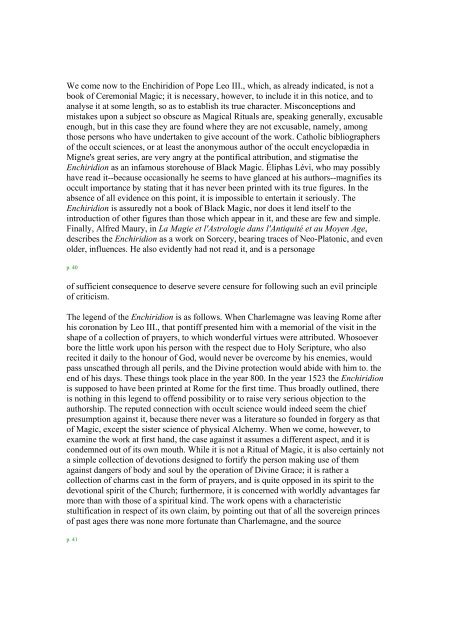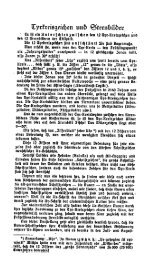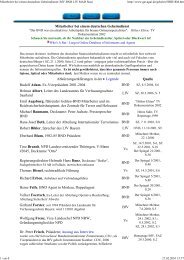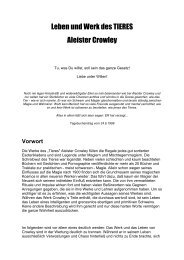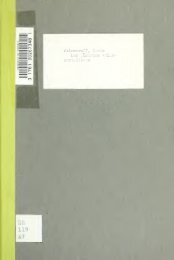The Book of ceremonial Magic
The Book of ceremonial Magic
The Book of ceremonial Magic
You also want an ePaper? Increase the reach of your titles
YUMPU automatically turns print PDFs into web optimized ePapers that Google loves.
We come now to the Enchiridion <strong>of</strong> Pope Leo III., which, as already indicated, is not a<br />
book <strong>of</strong> Ceremonial <strong>Magic</strong>; it is necessary, however, to include it in this notice, and to<br />
analyse it at some length, so as to establish its true character. Misconceptions and<br />
mistakes upon a subject so obscure as <strong>Magic</strong>al Rituals are, speaking generally, excusable<br />
enough, but in this case they are found where they are not excusable, namely, among<br />
those persons who have undertaken to give account <strong>of</strong> the work. Catholic bibliographers<br />
<strong>of</strong> the occult sciences, or at least the anonymous author <strong>of</strong> the occult encyclopædia in<br />
Migne's great series, are very angry at the pontifical attribution, and stigmatise the<br />
Enchiridion as an infamous storehouse <strong>of</strong> Black <strong>Magic</strong>. Éliphas Lévi, who may possibly<br />
have read it--because occasionally he seems to have glanced at his authors--magnifies its<br />
occult importance by stating that it has never been printed with its true figures. In the<br />
absence <strong>of</strong> all evidence on this point, it is impossible to entertain it seriously. <strong>The</strong><br />
Enchiridion is assuredly not a book <strong>of</strong> Black <strong>Magic</strong>, nor does it lend itself to the<br />
introduction <strong>of</strong> other figures than those which appear in it, and these are few and simple.<br />
Finally, Alfred Maury, in La Magie et l'Astrologie dans l'Antiquité et au Moyen Age,<br />
describes the Enchiridion as a work on Sorcery, bearing traces <strong>of</strong> Neo-Platonic, and even<br />
older, influences. He also evidently had not read it, and is a personage<br />
p. 40<br />
<strong>of</strong> sufficient consequence to deserve severe censure for following such an evil principle<br />
<strong>of</strong> criticism.<br />
<strong>The</strong> legend <strong>of</strong> the Enchiridion is as follows. When Charlemagne was leaving Rome after<br />
his coronation by Leo III., that pontiff presented him with a memorial <strong>of</strong> the visit in the<br />
shape <strong>of</strong> a collection <strong>of</strong> prayers, to which wonderful virtues were attributed. Whosoever<br />
bore the little work upon his person with the respect due to Holy Scripture, who also<br />
recited it daily to the honour <strong>of</strong> God, would never be overcome by his enemies, would<br />
pass unscathed through all perils, and the Divine protection would abide with him to. the<br />
end <strong>of</strong> his days. <strong>The</strong>se things took place in the year 800. In the year 1523 the Enchiridion<br />
is supposed to have been printed at Rome for the first time. Thus broadly outlined, there<br />
is nothing in this legend to <strong>of</strong>fend possibility or to raise very serious objection to the<br />
authorship. <strong>The</strong> reputed connection with occult science would indeed seem the chief<br />
presumption against it, because there never was a literature so founded in forgery as that<br />
<strong>of</strong> <strong>Magic</strong>, except the sister science <strong>of</strong> physical Alchemy. When we come, however, to<br />
examine the work at first hand, the case against it assumes a different aspect, and it is<br />
condemned out <strong>of</strong> its own mouth. While it is not a Ritual <strong>of</strong> <strong>Magic</strong>, it is also certainly not<br />
a simple collection <strong>of</strong> devotions designed to fortify the person making use <strong>of</strong> them<br />
against dangers <strong>of</strong> body and soul by the operation <strong>of</strong> Divine Grace; it is rather a<br />
collection <strong>of</strong> charms cast in the form <strong>of</strong> prayers, and is quite opposed in its spirit to the<br />
devotional spirit <strong>of</strong> the Church; furthermore, it is concerned with worldly advantages far<br />
more than with those <strong>of</strong> a spiritual kind. <strong>The</strong> work opens with a characteristic<br />
stultification in respect <strong>of</strong> its own claim, by pointing out that <strong>of</strong> all the sovereign princes<br />
<strong>of</strong> past ages there was none more fortunate than Charlemagne, and the source<br />
p. 41


